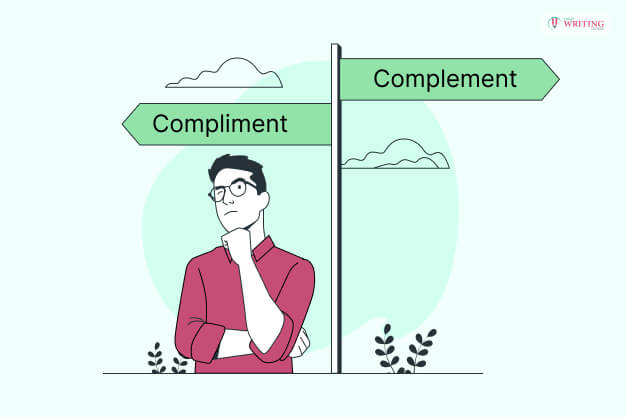Have you ever ‘complimented’ someone on their shoes, ‘complementing’ their outfit? Or send your ‘compliments’ to the chef for preparing a delicious dessert that ‘complemented’ your meal? Let’s face it. Getting a ‘compliment’ feels nice, and when something ‘complements’ another object or thing, it also feels nice. But getting confused between ‘compliment’ and ‘complement’ and wondering when to use which word is not nice at all. Likely, chose vs. choose.
In this article, we will explain the difference between ‘compliment’ and ‘complement.’ We will also explore the origin, meaning, and correct usage of these two words. So buckle up and get ready to conquer the compliment and complement confusion!
Compliment And complement: What Is The Difference?

Compliment and complement are two words that sound the same but have different meanings and spellings.
The word Compliment (with an I) means an expression of praise, admiration, or approval. For example, “She complimented him on his cooking skills.”
Meanwhile, the word complement (with an E) means something that completes, enhances, or makes perfect something else. For example, “The red scarf complements her blue dress.”
Compliment And Complement: Origin
Both words come from the Latin word complēre, meaning “to complete,” but they have evolved to have distinct meanings and usages over time. The word “Complement” took a direct route, entering Middle English through the Latin noun “complementum,” essentially retaining its original meaning.
In the 16th century, the word complement was used to mean “an act or expression of civility, respect, or regard,” as well as “something that completes or makes perfect something else.”
“Compliment” embarked on a more scenic tour. It entered English in the mid-1600s from the Spanish word “cumplimiento,” which meant “courtesy” or “fulfillment of duty.”
In the 17th century, the spelling of the first sense shifted to compliment, influenced by the French and Italian words for “expression of respect and civility.”
By the early 19th century, the word compliment had acquired the meaning of “an expression of praise or admiration,” as well as “a present or favor bestowed, a complimentary gift.”
Compliment: Meaning and Usage

As a noun, compliment means an expression of praise, admiration, or approval. As a verb, a compliment means to express such sentiments to someone. For example:
- She received many compliments for her performance.
- He complimented her on her beautiful dress.
- He complimented her on her beautiful smile.
- She was flattered by his compliment and blushed.
- He always gives sincere compliments to his friends.
- She paid him a compliment by saying he was a good leader.
- He complimented her on her singing voice.
- She was overwhelmed by the compliments she got from her fans.
- He complimented the teacher on his lecture.
- She complimented him on his sense of humor.
- He was embarrassed by the compliment and looked away.
Compliment: Correct Usage
We usually compliment someone for their appearance, achievement, or character. For instance:
- Outfit: You can compliment someone’s outfit and say it looks great on them.
- Meal: You can compliment the chef on the delicious meal they prepared.
- Work: You can compliment your colleague on their hard work and dedication.
These are just some of the common situations when you can compliment someone. But the truth is you can compliment someone on just anything you want. We have provided a list of compliments that you can check out:
- Your kindness and generosity are truly commendable.
- I must say, your outfit today is absolutely stunning!
- You have a fantastic sense of humor.
- You always know how to make me laugh.
- Your dedication and hard work are truly inspiring.
- I wanted to let you know that your presentation was outstanding. You really impressed everyone in the room.
- You have a great eye for detail. Your attention to the little things really makes a difference.
- Your cooking skills are incredible. That meal you prepared was absolutely delicious.
- I just wanted to say that your friendship means the world to me. You’re an incredible friend.
- You have an amazing work ethic. I’m always impressed by how much you accomplish.
Complement: Meaning and Usage

Complement is a word that has several meanings and uses, depending on the context. Some of the common definitions of the word ‘complement’ are as follows:
As a noun, complement means something that completes, enhances, or makes perfect something else. For example, “The red scarf complements her blue dress.”
As a verb, complement means to complete or enhance by providing something additional. For example, “The music complements her voice perfectly.”
In grammar, a complement is a part of a sentence that adds more information about the subject or object. For example, in “She is a teacher,” the word “teacher” is a subject complement.
In mathematics, complement is a term that refers to the amount or angle that is needed to make something complete. For example, in a right triangle, the two acute angles are complements of each other, because they add up to 90 degrees.
In biology, a complement is a system of proteins that helps the immune system to fight infections. For example, complement proteins can attach to bacteria and make them easier for white blood cells to destroy.
Example Sentences
Here are some more examples of sentences with the word Complement:
- The new artwork complements the modern aesthetics of the room.
- His calm demeanor complements his role as a mediator in resolving conflicts.
- Adding a touch of cinnamon to the recipe complements the flavors of the dish.
- The music complements her voice perfectly.
- The red wine complemented the cheese platter very well.
- She complemented his outfit with a matching scarf.
- The teacher complemented the students’ efforts with positive feedback.
- The salad is a perfect complement to the pasta dish.
- The blue sky complemented the green hills beautifully.
- Her skills complemented his experience.
How To Remember The Difference Between Compliment And Complement

The first step to remembering the difference between similar words like Compliment and Complement is having a clear understanding of their meaning and correct usage. In addition, you can also try this tip – associate the letter I in Compliment with the word Nice, which is sometimes used as a compliment.
In the case of the word Complement, you can associate it with the letter E with the word Complete, which is one of the meanings of Complement.
MORE FOR YOU:
- Transitive Vs. Intransitive Verbs: Understanding the Difference
- Ok Vs Okay: Which Is Correct, And What Is The Proper Usage?
- Understanding The Meaning and Proper Usage of Could vs Can
